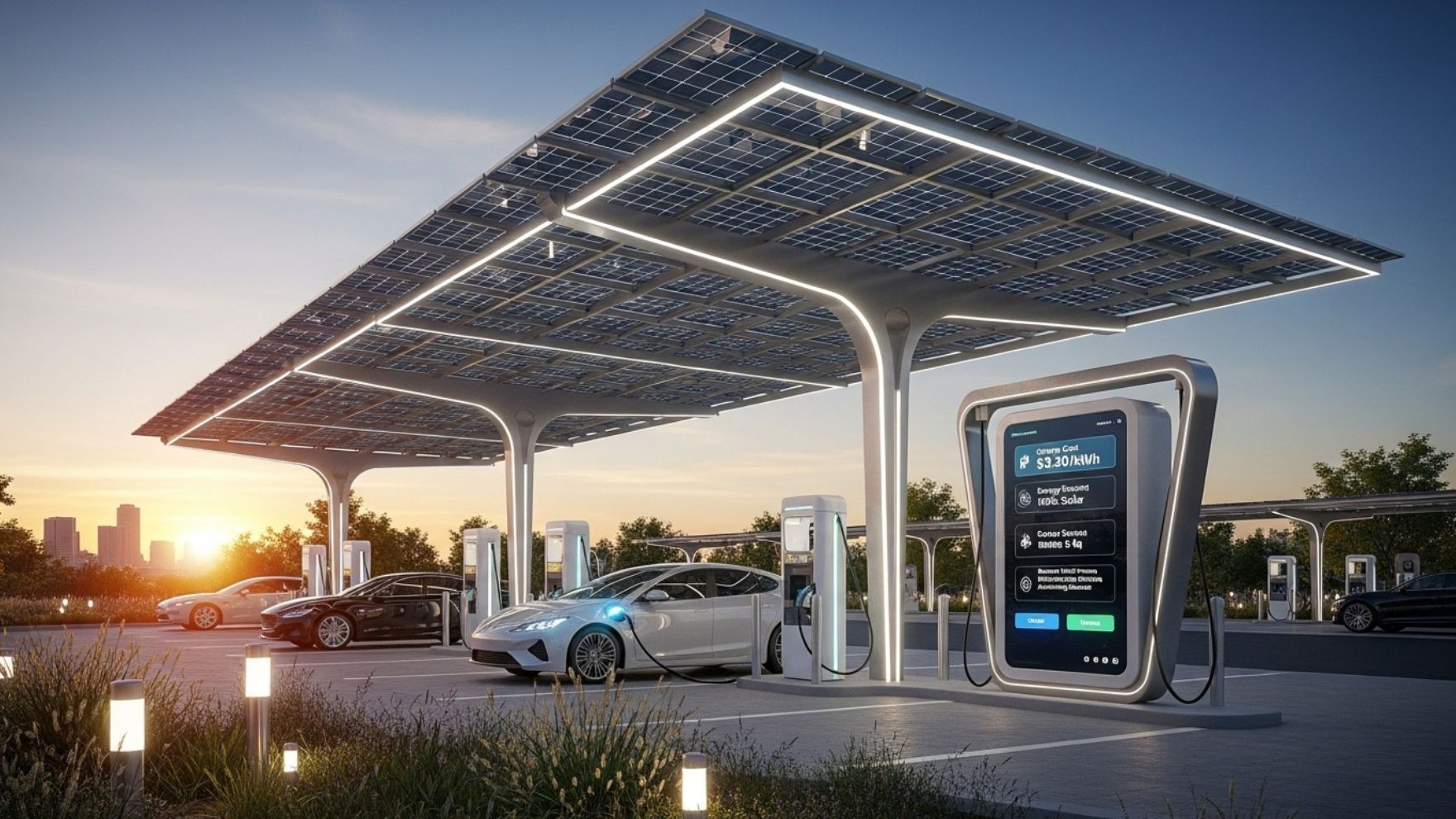Introduction
Solar EV Charging Station Cost: India’s electric mobility revolution is no longer a distant dream — it’s here and accelerating fast. With rising fuel prices, stricter emission norms, and government-backed incentives, electric vehicles (EVs) have become the future of transport. But for EV adoption to truly succeed, India needs an efficient and sustainable charging infrastructure.
That’s where solar EV charging stations come into play. By integrating renewable solar energy into the charging ecosystem, entrepreneurs can reduce power costs, increase reliability, and promote greener mobility. In this comprehensive guide, we’ll explore the cost of setting up a solar EV charging station in India, examine different business models, and analyse profitability, subsidies, and payback periods for 2025 and beyond.
Why Combine Solar Energy with EV Charging?
A standalone EV charger relies entirely on the grid. However, pairing it with solar panels offers several strategic and financial benefits:
- Lower Operating Costs:
Solar power significantly cuts down electricity bills — the single biggest recurring expense in charging operations. - Sustainable and Green Energy:
Solar energy eliminates the carbon footprint of charging, aligning perfectly with India’s clean energy targets. - Energy Independence:
Stations with on-site solar can continue operating even during grid outages, ensuring better uptime and reliability. - Government Incentives:
Several central and state-level policies support both EV infrastructure and rooftop solar, improving ROI and cash flow. - Public Appeal:
Eco-conscious consumers increasingly prefer clean charging options. Solar-powered stations can brand themselves as “green hubs.”
Core Components of a Solar EV Charging Station
A solar-powered charging facility integrates multiple systems that work together efficiently. Let’s break down the key components and their typical cost ranges:
1. EV Chargers
Chargers are classified by power rating and technology:
- AC Chargers (Slow/Moderate):
Suitable for residential complexes, malls, and workplaces.
Cost: ₹50,000 – ₹3,00,000 per unit. - DC Fast Chargers:
Used in public charging stations, highways, and fleet depots.
Cost: ₹7,00,000 – ₹20,00,000+ depending on power output (30–200 kW).
2. Solar Power System
This includes solar panels, mounting structures, inverters, and wiring.
- Estimated Cost: ₹50,000 – ₹70,000 per kW installed.
- Example: A 50 kW rooftop solar setup could cost around ₹25–35 lakh.
3. Battery Energy Storage (Optional)
Battery systems store excess solar energy for use during evenings or high-demand hours.
- Cost: ₹15,000 – ₹25,000 per kWh (depending on technology and brand).
4. Civil and Electrical Infrastructure
Covers site preparation, cabling, transformers, switchgear, foundations, and weatherproof enclosures.
- Cost: ₹2–5 lakh depending on site conditions.
5. Software, Networking & Payments
Includes user interfaces, payment gateways, charger management software, and remote monitoring.
- Cost: ₹20,000 – ₹1,00,000 per site.
6. Land or Lease
If you don’t own the site, leasing costs vary by location — ₹20,000 to ₹1 lakh per month in urban areas.
7. Maintenance & Compliance
Regular maintenance, service contracts, insurance, and safety certification add about 5–10% of annual operating costs.
Solar EV Charging Station Cost Breakdown (2025 Estimates)
| Station Type | Configuration | Estimated Total Cost |
| Home/Workplace (AC Charger) | 7–11 kW charger + 3–5 kW solar | ₹2 – ₹4 lakh |
| Public Slow Charger | 2–3 AC ports + 10 kW solar | ₹5 – ₹7 lakh |
| DC Fast Charger (30 kW) | Single unit + 20 kW solar | ₹12 – ₹16 lakh |
| Commercial Hub (60–120 kW) | 2–3 DC chargers + 50 kW solar | ₹30 – ₹60 lakh |
| Highway Charging Plaza (150–200 kW) | Multiple DC chargers + 100 kW solar | ₹80 lakh – ₹1.5 crore |
Note: Costs vary based on brand, location, utility connection charges, and solar capacity.
Read Also: Commercial Rooftop Solar System Payback in India 2025: A Complete Guide for Businesses
How Do Solar EV Charging Stations Make Money?
The main source of revenue is the charging fee per kWh, but there are additional income opportunities.
1. Per-Unit Energy Sales
Charging rates typically range between:
- AC Slow Charging: ₹8 – ₹14/kWh
- DC Fast Charging: ₹15 – ₹25/kWh
With solar integration, the effective cost of energy may drop to ₹3–₹5/kWh, widening profit margins.
2. Parking & Service Fees
Some operators charge an additional parking or service fee per hour or per session.
3. Subscription or Membership Plans
Offer discounted charging packages to regular users or fleet partners.
4. Advertising & Branding
Large stations and highway hubs often display ads on digital screens or solar canopies for extra income.
5. Battery Swapping / Fleet Charging
Integrate a battery-swapping system for e-rickshaws, scooters, or delivery fleets to maximise utilisation.
Business Models for Solar EV Charging in India
Choosing the right business model is critical to long-term success. Here are the most practical options in 2025:
1. Host–CPO Partnership Model
- Land or building owner provides space.
- Charging Point Operator (CPO) installs and manages chargers.
- Profits are shared, or fixed rent is paid to the host.
✅ Best for malls, parking lots, hotels.
2. Owner–Operator Model
- Entrepreneur owns and runs the station.
- Full control over revenue and maintenance.
✅ Best for independent startups and fleet operators.
3. Franchise Model
- Partner with established charging networks (like Tata Power EZ Charge, Statiq, ChargeZone, etc.).
- Lower operational hassle and stronger branding.
✅ Ideal for first-time investors.
4. Public–Private Partnership (PPP)
- Government provides land or support.
- Private partner handles operations.
✅ Suitable for highways, metro stations, and transport hubs.
5. Energy-as-a-Service Model
- Third party installs and operates the solar + battery system.
- Charging operator pays only for energy consumed.
✅ Great for reducing upfront investment.
Profitability and ROI Analysis (Example Model)
Let’s examine a sample financial model for a solar-powered fast-charging station.
Setup Details:
- 30 kW DC fast charger: ₹11 lakh
- 50 kW rooftop solar: ₹30 lakh
- Civil & electrical work: ₹2.5 lakh
- Total Capex: ₹43.5 lakh
Operating Assumptions:
- Average energy sold: 200 kWh/day
- Charging price: ₹18/kWh
- Energy cost (after solar savings): ₹10/kWh
- O&M + rent + staff: ₹2.5 lakh/year
Annual Financials:
- Revenue: ₹13.1 lakh/year
- Net profit before depreciation: ₹8–9 lakh/year
- Payback period: 4.5–5.5 years
- Life of system: 10–15 years
Result:
Once utilization increases, profits compound quickly. Beyond year five, operational profit margins can exceed 40–45%.
Government Subsidies and Incentives (2025 Updates)
To promote EV adoption, the Indian government has introduced several financial incentives and policies.
1. Central-Level Incentives
- Under the PM e-Drive and EV Infrastructure Mission, charging stations are eligible for capital support.
- Earlier, FAME-II supported over 2,600 charging stations in Phase I and II.
- GST on EV chargers has been reduced to 5% (same as EVs).
2. Rooftop Solar Subsidies
- Central Financial Assistance (CFA) under MNRE reduces upfront solar cost.
- State DISCOMs offer net metering, allowing operators to export excess solar energy.
3. State-Level Benefits
- States like Maharashtra, Tamil Nadu, Delhi, and Gujarat offer extra benefits:
- Land allocation on nominal lease rates.
- Subsidy on equipment or electricity tariff reduction.
- Stamp duty or property tax exemptions.
- Land allocation on nominal lease rates.
4. Bank Loans and Tax Benefits
- EV charging is included under the Priority Sector Lending (PSL) category in several banks.
- Solar equipment also qualifies for accelerated depreciation benefits under the Income Tax Act.
Selecting the Right Location
The success of your charging business largely depends on site selection. Consider:
- Highways and Expressways: For fast-charging and long-distance travelers.
- Commercial Zones: Offices, malls, and multiplexes with high parking time.
- Fleet Depots: Consistent demand from logistics or delivery partners.
- Residential Complexes: Steady usage by EV owners.
- Tourist Spots and Hotels: Ideal for destination charging.
Tip: Locations with at least 20–30 EVs per day passing by offer solid utilization potential.
Operations and Maintenance (O&M) Essentials
Running a charging station efficiently requires professional management.
- Charger Uptime: Maintain uptime above 95% for user satisfaction.
- Periodic Maintenance: Clean solar panels monthly and inspect connectors regularly.
- Cybersecurity & Payments: Use secure payment gateways (UPI, cards, apps).
- Customer Support: 24/7 helpline boosts reliability perception.
- Software Analytics: Track energy sales, load patterns, and revenue in real time.
Challenges in Solar EV Charging Business
While the opportunity is vast, challenges remain:
- High Upfront Capex — Mitigate via loans or leasing models.
- Low Initial Utilization — Start with scalable infrastructure.
- Grid Constraints — Use hybrid solar + battery systems.
- Policy Complexity — Different states have varied net-metering and EV tariff structures.
- Hardware Compatibility — Choose chargers supporting Bharat AC/DC, CCS2, and CHAdeMO standards.
Environmental and Social Impact
Each solar EV station contributes to:
- Lowering India’s carbon emissions.
- Reducing urban air pollution.
- Creating skilled green jobs in engineering, installation, and maintenance.
- Supporting national goals of 500 GW renewable capacity by 2030 and net-zero by 2070.
By 2030, widespread deployment of solar-powered charging could offset millions of tons of CO₂ annually.
Step-by-Step Guide to Starting a Solar EV Charging Business
- Conduct Feasibility Study: Analyze EV traffic and power availability.
- Choose Business Model: Host-CPO, franchise, or owner-operator.
- Design System Layout: Determine solar size, charger type, and battery needs.
- Apply for Approvals: Get local DISCOM and municipal permissions.
- Install & Test Equipment: Ensure compliance with BIS and MoP standards.
- Launch Operations: Integrate payments and monitoring systems.
- Promote Your Station: Partner with EV apps, advertise locally, and offer loyalty rewards.
Frequently Asked Questions (FAQs)
Q1. What is the minimum investment required?
A: Small AC charging setups can start from ₹3–₹5 lakh, while DC fast-charging hubs may need ₹30 lakh–₹1 crore.
Q2. Is the business profitable?
A: Yes. With good utilization (150–300 kWh/day), solar integration, and optimized pricing, ROI is achievable in 4–6 years.
Q3. Do I need a license to set up a charging station?
A: No. As per the Ministry of Power (MoP) guidelines, no license is required — only safety and metering compliance.
Q4. Can I sell excess solar power to the grid?
A: Yes, through net metering or open access policies, depending on your state regulations.
Q5. How long do solar panels last?
A: Around 20–25 years, with 80% performance guaranteed even after 20 years.
Conclusion
The synergy of solar energy and electric vehicle charging offers one of India’s most promising clean-tech business opportunities. With declining solar costs, progressive government policies, and a booming EV market, 2025–2030 will be the decade of green mobility entrepreneurship.
Whether you’re an investor, fleet owner, or property developer, a solar EV charging station combines sustainability with profitability. By choosing the right business model, leveraging incentives, and ensuring high uptime, you can build a future-proof venture that contributes to India’s clean energy transition.
In short — solar EV charging isn’t just a business idea anymore; it’s the foundation of tomorrow’s transportation economy.





I am interested in host cpo model
I want to setup s commercial solar power EV charging station. For that purpose I have a land on highway. Please contact me on given number 9411622921
Required contact details for establishing ev charging station
Please send me quotation & detailed information
Terrific, mention some set up supporters or step by step procedure processes or company names that guide for more helpful assistance
Good 😊
We have a property in state hi way
we provide solar based EV charging. contact sudhir gupta 9818639784
I want to setup s commercial solar power EV charging station. For that purpose I have a land on highway. Please contact me on given number 9328193647/8200668218
By the time you setup ev charging stations in India, technology will change. Ev will get charged by itself by fixing solar panel on its roof .
Muje 30kw ev station lagwana he mere contact no.9406529011